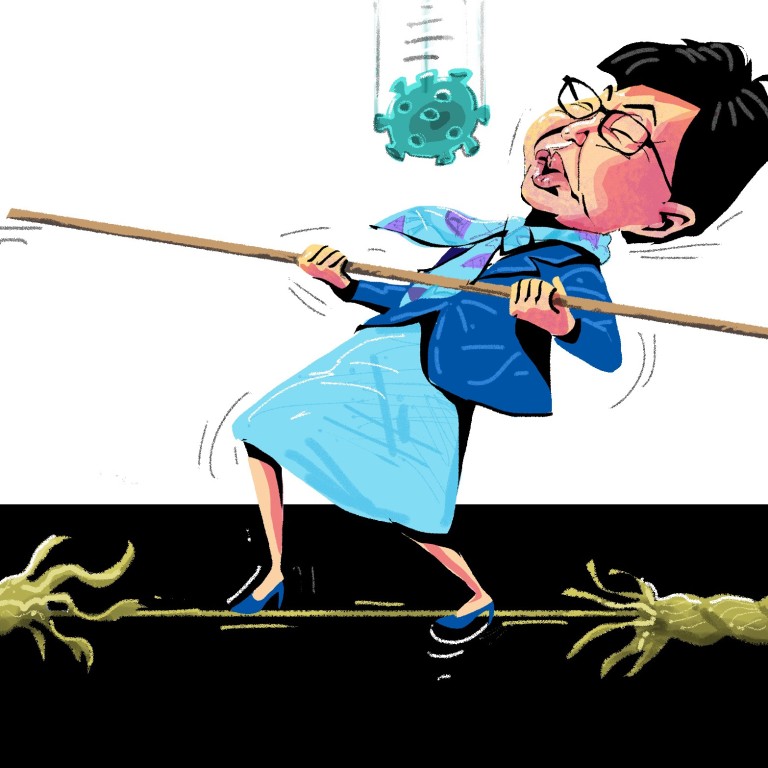Not since 2003 has Hong Kong been embroiled in a double whammy of a political crisis and public health scare. Back then, mass protests against
national security legislation, coupled with the
severe acute respiratory syndrome outbreak and economic recession, triggered an unprecedented governance crisis that ultimately led to the departure of then chief executive Tung Chee-hwa.
Since mid-2019, a fast spreading
anti-government movement unleashed by the extradition bill controversy has seen incessant protests by hundreds of thousands of people, sometimes accompanied by arson, vandalism and disrespect of government authority. Many of those taking part and arrested are young students. In other societies, such large-scale outbursts would have toppled the leadership.
There is no sign of the protest movement subsiding and government credibility has been badly hit. The outbreak of the new coronavirus originating from Wuhan has exposed how an administration lacking popularity and legitimacy is showing
further stress amid uncertainty, blame and public fear as a result of the epidemic threat.
Past lessons here and elsewhere tell us that the mishandling of a natural calamity is often a turning point in the fate of a government – the Sars outbreak for Hong Kong in 2003,
Hurricane Katrina for the US in 2005,
Typhoon Morakot for Taiwan in 2009, and the
devastating bush fires in Australia since late last year.
In 2003, once the Sars epidemic was under control, Hong Kong began to recover gradually with Tung withdrawing the national security bill and Beijing adopting support measures like the
Closer Economic Partnership Agreement (Cepa) and the individual visitor scheme to boost the local economy through integration, and later replacing Tung with Donald Tsang Yam-kuen, a former administrative officer, in 2005.
Pan-democrats then turned their agitation towards demands for universal suffrage in electing the chief executive and legislature. Both the central and Hong Kong governments were willing to engage in dialogue. Tsang’s ascendancy attracted confidence at a time when the public at large still trusted the integrity of the civil service.
Such an approach to alleviate the governance crisis, however, cannot be replicated this time.
Economic integration measures no longer work to reduce political pressure. With a more strained “two systems” relationship and an assertive nativism driving
hostility towards mainlanders in recent years, integration without addressing the city’s capacity constraints and institutional differences would backfire.
Last year’s
extradition bill debacle marked the political fall of Chief Executive Carrie Lam Cheng Yuet-ngor. Using only
police force to deal with anti-government activism has resulted in more violent confrontations, jeopardising the hard-earned professional image of the police and further alienating ordinary residents.
Though the mainland was also the source of the Sars virus in 2003, Hong Kong people back then showed some empathy because they regarded themselves as part of the big family. Today, cross-border relations are at a low ebb. The coronavirus has reinforced apathy and
calls for exclusion, against the backdrop of a new geopolitical landscape where the US is leading a “
clash of systems” and trade war with China to contain its rise.
Administrative fragmentation, top-down leadership styles and governance defects coexist with the mainland’s rapid economic and technological advancement. Policy and management failures are not infrequent, as the
Wuhan epidemic unveils.
Hong Kong faces a dilemma. Arguably, it cannot avoid collateral damage from those negative aspects of the China factor, but can it continue to display distinctions as a global city under “two systems” to articulate a pluralist China in pursuit of further reform? The choice is both Hong Kong’s as well as that of national leaders in Beijing.
Ultimately, the epidemic threat will subside, but not before inflicting further damage on the administration and economy. The political discontent that emerged last year is persisting, with no end in sight. While protesters may lack any endgame, the government’s strategy to end turmoil also fails to instil optimism.
Without a political solution, the stalemate has become entrenched, like an epidemic, causing dismay and despair across the political and social spectrums.
Beijing will not allow a revolution or regime change to happen, a bottom line that not even radical activists dare to cross. No matter how disgruntled ordinary people are with the government, they only seek reform within the system, in the form of an investigation of a conflict that has resulted in hatred and violence on all sides, and political reform towards universal suffrage to return to them a sense of ownership of the city’s future under “one country, two systems”.
Over the past months, the government has failed to grasp opportunities for reconciliation and rebuilding trust. The road ahead will now be narrower. Options are in shorter supply. But better late than never. If goodwill still exists, adversity could force all sides to forge the determination to review the fundamental situation and contemplate bold but necessary choices.
Anthony Cheung Bing-leung is research chair professor of public administration at the Education University of Hong Kong and a former secretary for transport and housing (2012-17)


